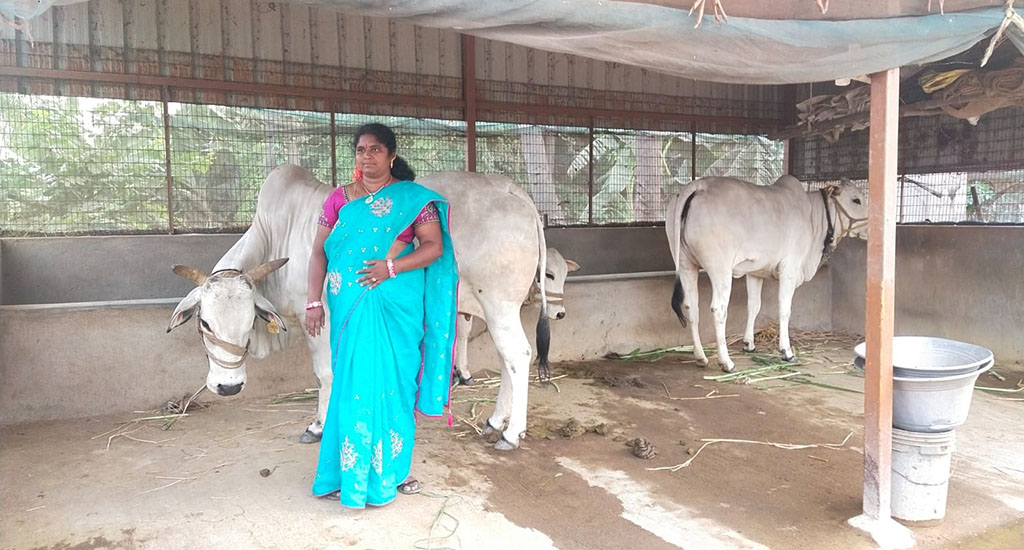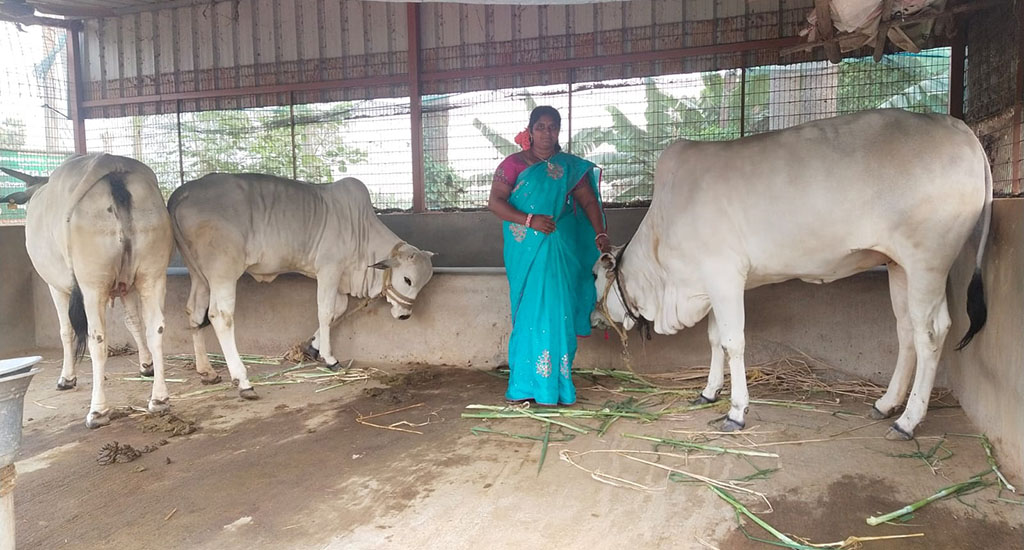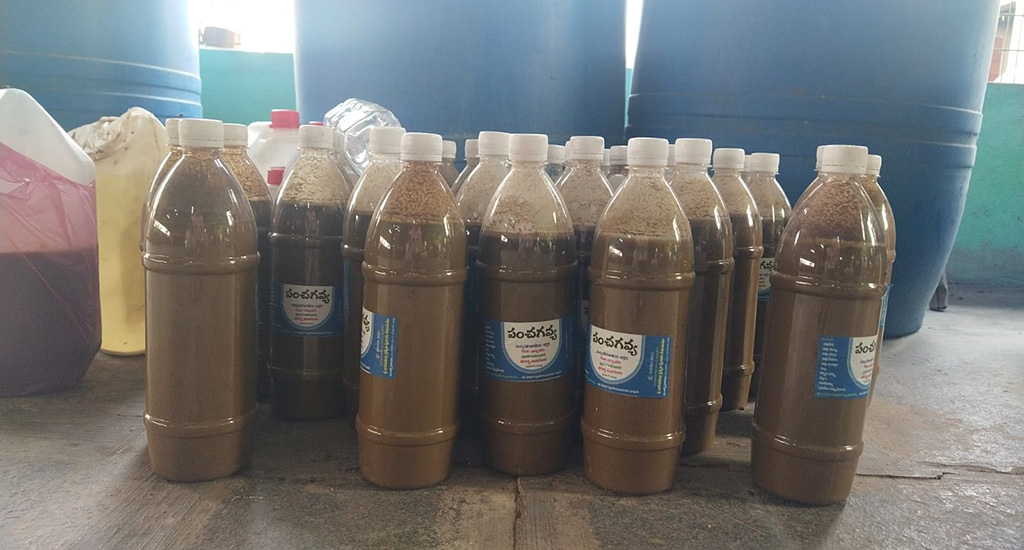
From the bladder of a cow
Natural farming based on the clever use of cow waste is transforming lives in Andhra Pradesh as Sanjiv Phansalkar of the VikasAnvesh Foundation discovered close up.

Natural farming based on the clever use of cow waste is transforming lives in Andhra Pradesh as Sanjiv Phansalkar of the VikasAnvesh Foundation discovered close up.
K Usharani Reddy of Andhra Pradesh is a 38-year-old mother of two bright, young college students. She was married by her parents when she was barely 17, but two years later, shortly after her two children were born, she lost her husband to an accident. Devastated, Usha went to live with her parents in the Nuathokki village in Mangalgiri mandal of Guntur District.
Her mother was a member of the local women’s self-help group (SHG), formed under the state’s rural livelihoods programme, which she also joined. Soon, she was hard at work managing her parents’ farms, feeling a deep gratitude towards her mother.
“My mother is my God. She gave me all the strength to see through the bad times,” said Usha.
About six years back, Usha was trained in the techniques and processes of natural farming, then termed by the organisation as “zero budget natural farming” (ZBNF). To set her on the path of following these practices on her own farms as well as helping other farmers, Usha got a grant of Rs 50,000 from the promoting organisation. From her SHG she borrowed another lakh. She built a cow shed with a gently sloping, concrete floor and a channel at the lower end for her three “desi” cows. When they urinated, the fluid flowed down the slope and through the channel into a collection pit, also lined with cement. Dung would drop on the floor and could be collected.
Usha was trained in preparing several products: the amrits, or nectars, are the plant nutrients and the astras are the plant protection materials. These astras need the leaves of several plants and trees, such as papaya, guava, datura, pongamia, calotropis and neem of which there are plenty in Usha’s surrounding areas.
She explained the process of making these substances to me showing various drums and equipment used for the processing.

“Farmers who wish to make their own inputs can take the cow urine from the collection pit for free, but they have to pay me a fixed price per kilogram (for solids) or per litre (for liquids),” she said.
She pointed to a large heap of finished ghan-jeevamrit, solid manure, and told me that it could easily fill 400 bags of 50 kg each, thus accounting for 20 MT. She explained to me the quantities of the substances necessary for growing good crops in the natural farming pattern.
“To be very frank, my own father was very opposed to the idea of shifting from chemical farming (a term she used to refer to conventional farming, which uses synthetic fertilisers and chemical pesticides) to natural farming. He only allowed me to do our kitchen garden in this pattern. But when he saw the results, he agreed to put our farms under this system and now he is an ambassador for the natural farming system,” she said.
In a mischievous manner I asked her if she kept the cows for milk or for urine. She recognised the tease but with calm seriousness she said what mattered to her was the animal waste and not milk.
“For the milk business, it is better to keep cross-breeds but their urine is much less effective than the urine of desi cows,” she said.
I was and still am stumped, but it does seem that there is pith in that statement.
Usha’s dynamism and hard work encouraged the organisation to help her set up a natural farming input shop. This shop comprises a fairly large temporary structure of poles and tin sheds in which she does the processing for producing the materials as well provides space to store them.

“I now have six persons working in this enterprise. Four are hired labourers and two are from within my family. My wage bill for a month is Rs 50,000,” Usha said.
Quite taken aback with this information, I probed about the business turnover.
She did an annual business of Rs 40 lakhs last financial year but rued the impact of the pandemic.
“COVID hit us hard and our business was reduced,” Usha said.
This financial year she may exceed Rs 50 lakhs. Net of all her paid out costs, she earns about Rs 10 lakhs from this activity.
Usha was at pains to emphasise that she was not working to make profits.
“I want every farmer here to adopt natural farming method. This will ensure that they eat healthy and that their soils remain rich and productive,” she said.
The local voluntary organisation has encouraged Usha to process the produce from her farm as well as the farms of her neighbours. She has small processing facilities for shelling and grinding and sells turmeric powder, chilli powder, three or four traditional varieties of rice as well as some pulses.
She has established a brand “Vasvi Durga” and also obtained FSSAI license to market the food products for her input/output shop for the natural farming community.
Usha took us on a tour of her kitchen garden and her farm on which she had planted coriander.
A small pit of soil was dug form the farm and poured into a bowl to reveal a small gang of earthworms wriggling in the soil. The presence and density of earthworms is a sure sign of soil health. The soil texture also was fine yet quite granular.
The day we visited also happened to be her birthday. She gave us sumptuous goodies to munch on, including a portion of “naturally grown” papaya.
In quite a child-like manner she expressed how proud she was doing this work and building her enterprise to this level. As we prepared to leave, her younger son, a strapping boy of 16 came on a two-wheeler, carrying a large bag.
“My children also help me in carrying stuff to customers or bringing their raw produce,” Usha said.
Indeed the natural farming methods based on cow urine and dung have reformed Usha’s life perhaps much more than they may have transformed the agriculture of her village.
Wellbeing has indeed spread from the bladder of the cow to the whole community.
Sanjiv Phansalkar is the director of VikasAnvesh Foundation, Pune. He was earlier a faculty member at the Institute of Rural Management Anand (IRMA). Phansalkar is a fellow of the Indian Institute of Management (IIM) Ahmedabad.